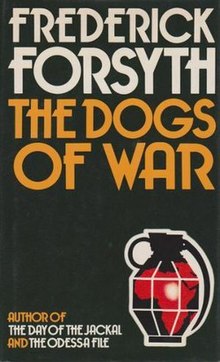The Dogs of War (novel)

First edition (UK)
|
|
| Author | Frederick Forsyth |
|---|---|
| Cover artist | Ian West / Michael Brett |
| Country | United Kingdom |
| Language | English |
| Genre | War novel |
| Publisher |
Hutchinson (UK) Viking Press (US) |
|
Publication date
|
1974 |
| Media type | Print (hardback & paperback) |
The Dogs of War (1974) is a war novel by Frederick Forsyth featuring a small group of European and African mercenary soldiers hired by a British industrialist to depose the government of the fictional African country of Zangaro.
An eponymous film was released in 1980, based upon the novel and directed by John Irvin. The movie was filmed on location in Belize.
The mercenary protagonists, like the protagonist in the author's earlier novel The Day of the Jackal (1971), are professional killers—ruthless, violent men, heroic only in the loosest sense of the word. Thus, they are anti-heroes. Initially introduced as simply killers, as the novel progresses they are gradually shown to adhere to a relatively moral mercenary code; however as the mercenary leader Shannon tries to explain at one point, it is difficult for civilians to understand this.
The story details a geologist's mineral discovery, and the preparations for the attack: soldier recruitment, training, reconnaissance, and the logistics of the coup d'état (buying weapons, transport, payment). Like most of Forsyth's work, the novel is more about the protagonists' occupational tradecraft than their characters. The source of the title, The Dogs of War, is Act III, scene 1, line 270 of Julius Caesar (1599), by William Shakespeare: Cry, 'Havoc!', and let slip the dogs of war.
Forsyth draws upon his journalistic experiences in reporting the 1970 Biafran War between Biafra and Nigeria; though fictional, the African 'Republic of Zangaro', is based upon Equatorial Guinea, a former Spanish colony. The novel's dedication to five men named Giorgio, Christian, Schlee, Big Marc and Black Johnny and "the others in the unmarked graves" concludes: "at least we tried"—and clearly alludes to Forsyth's time in Biafra; the dark tone and cynical plot of the story stem from the same source.
1970: The prologue shows "Cat" Shannon and his fellow mercenaries leaving a West African war they have lost, saying their goodbyes to the General, who employed them for six months.
...
Wikipedia
